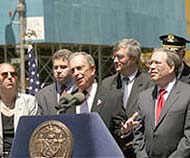Article from: www.thenewspaper.com/news/17/1770.asp
5/25/2007
New York to Bring in Millions from Intersection Tickets
New York City, New York wants $27 million in new revenue from blocking the box tickets.
 New York City, New York Mayor Michael R. Bloomberg (R) plans to generate millions in extra revenue by allowing the low-paid civilians who direct traffic to issue $115 tickets to motorists. Bloomberg announced the "Blocking the Box" ticketing proposal in Times Square yesterday as part of larger revenue raising proposal that includes levying a congestion tax on drivers entering the city during rush hour.
New York City, New York Mayor Michael R. Bloomberg (R) plans to generate millions in extra revenue by allowing the low-paid civilians who direct traffic to issue $115 tickets to motorists. Bloomberg announced the "Blocking the Box" ticketing proposal in Times Square yesterday as part of larger revenue raising proposal that includes levying a congestion tax on drivers entering the city during rush hour.
"Putting additional Traffic Enforcement Agents on the streets and allowing them to ticket those who 'block the box' will yield tangible public health and economic benefits," said Bloomberg.
Drivers in a heavily congested city such as New York can often enter an intersection on a green light but become stuck in the middle of it when traffic unexpectedly grinds to a halt. Each time this happens, motorists traveling in the other direction become stuck and the "gridlock" spreads, tying up traffic throughout the city.
Bloomberg wants Traffic Enforcement Agents, meter maids who direct traffic and earn a starting salary of between $23,087 and $26,772 a year, to begin issuing tickets to anyone caught partly in an intersection when the light turns red. Instead of approaching and identifying the motorist, however, these agents will merely jot down license plate numbers in a handheld computer. The registered owners of any vehicle entered on an agent's list will receive a citation in the mail.
With 2800 agents, the potential revenue windfall could be in the tens of millions. If just 1000 of the agents wrote a single ticket a day, the city would collect $27 million in new revenue. Bloomberg in the past has embraced the concept of measuring the performance of police officers -- and their potential to earn a financial bonus -- by the number of tickets they write.
"We project how much money we're going to get from enforcing the law," Bloomberg said last year. "You do need the money, and if at the end of the year we don't get it from fees and fines, then it comes in taxes."
 New York City, New York Mayor Michael R. Bloomberg (R) plans to generate millions in extra revenue by allowing the low-paid civilians who direct traffic to issue $115 tickets to motorists. Bloomberg announced the "Blocking the Box" ticketing proposal in Times Square yesterday as part of larger revenue raising proposal that includes levying a congestion tax on drivers entering the city during rush hour.
New York City, New York Mayor Michael R. Bloomberg (R) plans to generate millions in extra revenue by allowing the low-paid civilians who direct traffic to issue $115 tickets to motorists. Bloomberg announced the "Blocking the Box" ticketing proposal in Times Square yesterday as part of larger revenue raising proposal that includes levying a congestion tax on drivers entering the city during rush hour.